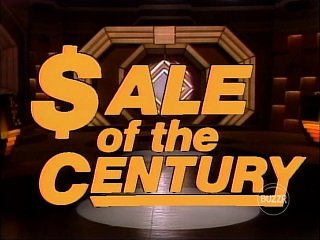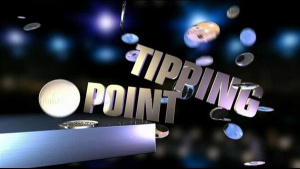
Family Feud is an American television game show created by Mark Goodson. Two families compete on each episode to name the most popular answers to survey questions in order to win cash and prizes.
Family Fortunes is a British television game show based on the American game show Family Feud. The programme ran on ITV from 6 January 1980 to 6 December 2002. A celebrity version, All Star Family Fortunes, followed from 2006 to 2015. In 2020, the original version of the show returned after 17 years with Gino D'Acampo as host.

Blockbusters is a British television quiz show based upon an American quiz show of the same name. A solo player and a team of two answer trivia questions, clued up with an initial letter of the answer, to complete a path across or down a game board of hexagons.

Sale of the Century is an American television game show that originally debuted on September 29, 1969, on NBC daytime. It was one of three NBC game shows to premiere on that date, the other two being the short-lived game shows Letters to Laugh-In and Name Droppers. The series aired until July 13, 1973, and a weekly syndicated series began that fall and ran for one season.

Hot Potato is a television game show that was broadcast on NBC in the United States from January 23 to June 29, 1984. From April 23 until its conclusion, the show was known as Celebrity Hot Potato.

Now You See It is an American television game show created by Frank Wayne for Mark Goodson-Bill Todman Productions. The object of Now You See It is to answer general knowledge trivia questions by finding the answers hidden in a grid, similar to a word search puzzle.
Idiot Savants is an American television game show on the MTV network which ran from December 9, 1996, to April 25, 1997. It was created by Michael Dugan and Chris Kreski, directed by Steve Paley, and hosted by comedian Greg Fitzsimmons.
Hollywood Showdown is an American game show that aired on both PAX TV and Game Show Network from January to June 2000, then returned solely to GSN on January 1, 2001 and ran until March 30 of that year. Reruns aired on GSN again from September 2004 to April 2005 plus June 2006 and June 2007 on TV Guide Network. Todd Newton served as host, with Randy West announcing.
Blankety Blanks is an Australian game show based on the American game show Match Game. It was hosted by Graham Kennedy on the 0-10 Network from 1977–1978.
100 mexicanos dijeron, later rebranded to 100 mexicanos dijieron, is a Mexican version of the Goodson-Todman game show from the 1970s, Family Feud, produced in Mexico City by the Las Estrellas.

Bert's Family Feud was an Australian game show remake based on the American show of the same name. The series was produced by Grundy Television in conjunction with FremantleMedia. It was broadcast on the Nine Network and hosted by Bert Newton. The title refers to host Bert Newton as the show intended to feature celebrities and their families as contestants.
Connections is a British game show, devised and produced by John Huntley, that aired on ITV from 26 April 1985 to 6 July 1990. The daytime version is hosted by Sue Robbie from 1985 to 1988 and Simon Potter from 1989 to 1990, while the primetime version is hosted by Richard Madeley.
¿Qué dice la gente? is a Spanish-language adaptation of the American game show Family Feud which was produced in the United States, that aired on Spanish-language channel Telefutura in 2006. It was itself the American version of Mexican game show, 100 mexicanos dijeron, originally hosted by Marco Antonio Regil for two seasons from 2006 until 2008 followed by Omar Chaparro who took over for the last nine weeks of the series when it was filmed in Miami. Jackie Vilarino and Survivor: Nicaragua Contestant Brenda Lowe both served as co-hosts for the show's run. The show premiered on June 12, 2006, and ended on November 14, 2008. In 2008, the show was reduced to a half-hour in order to pair up with the Spanish-language version of the short-lived 1982-83 American game show Child's Play under the name Dame la Pista or hosted by Alessandra Rosaldo, but it was ultimately cancelled along with ¿Qué dice la gente? for "unknown" reasons.

Family Feud is an Australian game show based on the American show of the same name. It aired on Network Ten from 14 July 2014 until 22 July 2018 and in August 2020 for a special 10-episode series. The show was hosted by Grant Denyer. This was the fourth Australian version of the format, the previous incarnation being Bert's Family Feud hosted by Bert Newton in 2006. Ten became the third network to adapt the format. From 2016, Ten also screened a celebrity edition titled All Star Family Feud. The show was filmed at Global Television Studios in Southbank, Melbourne from 2014 to 2017 and at Network Ten Studios in Pyrmont, Sydney in 2018 & 2020.
La Guerre des clans is a Canadian French language television game show based on the American series Family Feud and was hosted by Luc Senay. It was taped at TQS in Montreal and ran from 1992 to 1997.

Pointless is a British television quiz show produced by Banijay subsidiary Remarkable Entertainment for the BBC hosted by Alexander Armstrong. In each episode, four teams of two contestants attempt to find correct but obscure answers to four rounds of general knowledge questions, with the winning team eligible to compete for the show's cash jackpot.

Alan Hughes' Family Fortunes is an Irish television game show, based on the American game show Family Feud and sharing the name of the British game show. Hosted by Alan Hughes, it aired on TV3 in Ireland on Saturday nights at 9 pm.

Tipping Point is a British quiz show that has aired on ITV since 2 July 2012. The show also airs repeats on U&W, which is owned by the UKTV network, and Really, which is owned by Warner Bros. Discovery. The programme is presented by Ben Shephard and features three players answering questions on the subject of general knowledge in order to win counters, which they use on a large coin pusher arcade-style machine, that represent (mainly) cash prizes. The machine was hand built by Lotus Cars mechanics working on the weekend.
One Hundred and Eighty is a British darts game show that aired on Sky 1 from 15 September to 22 October 2015 and was hosted by Davina McCall. Russ Bray served as onstage referee, while Freddie Flintoff and Rod Studd provided commentary from a backstage control booth.

America Says is an American television game show hosted by John Michael Higgins and broadcast on Game Show Network. The series consists of two teams of four guessing the top answers to fill-in-the-blank survey questions. It is a restructuring of the Audience Match portion of Match Game.










